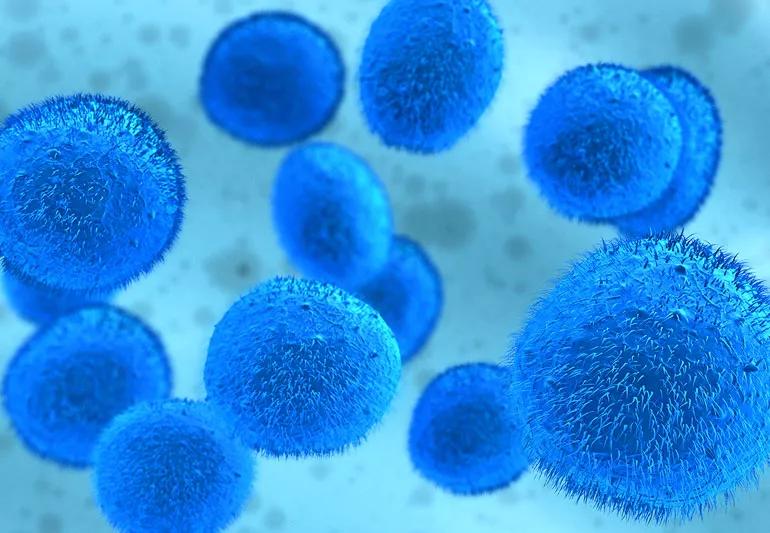An innovative treatment option may be possible

Image content: This image is available to view online.
View image online (https://assets.clevelandclinic.org/transform/9e41440c-5683-478b-9e69-762fed6cf23f/stemCells-157739130-770x553_jpg)
Stem Cells microscopic view
Opioid addiction and overdose. We’ve heard about it in the news and some of us have seen it up close in our neighborhoods or families. Deaths from overdose have swelled over the last three decades, with the U.S. Department of Health and Human Services declaring the opioid crisis a public health emergency in 2017.
Advertisement
Cleveland Clinic is a non-profit academic medical center. Advertising on our site helps support our mission. We do not endorse non-Cleveland Clinic products or services. Policy
According to the Centers for Disease Control and Prevention (CDC), there were 42,249 deaths from opioid overdose in 2016, and some 5 million people continue to misuse prescription opioids today.
Often it is a prescription for pain meds like oxycodone or fentanyl following a medical procedure that starts people on the road to addiction. Statistics from the CDC show that after just eight days of taking an opioid prescription, the risk of long-term opioid use is 13.5%. After a month of use, the risk increases to nearly 30%.
Healthcare experts are searching for ways to wean patients off of opioids for pain management. Cleveland Clinic is leading exciting research looking at stem cell therapy to prevent or reverse opioid tolerance, which is a main reason that people increase the dose of opioids they’re taking.
Pain management expert Jianguo Cheng, MD, PhD, says widespread chronic use of opioids can lead to opioid tolerance and worsened pain, an effect known as opioid-induced hyperalgesia. Both are major barriers to safely and effectively treating pain.
In early research, stem cell therapy is showing great potential for preventing opioid tolerance ― and reversing it after it has started.
Advertisement
Tapering a patient’s opioid dose while maintaining the therapeutic effect is required in many cases to minimize the risk of overdose.
Stem cells are special types of cells that have the ability to multiply and self-renew and become any tissue in your body from cartilage cells, to muscle cells to nerve cells. They also have the remarkable capacity to powerfully modulate immune function and reduce painful inflammation of the nerves.
Over the last few years, laboratory research by Dr. Cheng and his team shows that a special type of stem cells, called a mesenchymal stem cells (MSCs), suppress inflammation of the central and peripheral nervous systems. This inflammation is a key mechanism of opioid tolerance, opioid-induced hyperalgesia and nerve pain. Stem cell therapy has actually prevented and reversed OT and OIH when tested in the lab.
The research found that intravenous (IV) stem cell transplantations and intrathecal injections (injecting into the spinal canal) were safe with long-lasting preventive and therapeutic effects. Dr. Cheng says, “Stem cell therapy has enormous potential to profoundly impact clinical practice and improve opioid effectiveness and safety. Using stem cell transplantation may allow for a low dose of opioids to be effective in the treatment of pain.”
The research team is hoping to get FDA approval and secure funding to begin clinical trials and applications in patients. The goal, Dr. Cheng says, is to be doing clinical trials within the next three years so that stem cell therapy to reduce opioid dosages can be used in practice in the near future.
Advertisement

Sign up for our Health Essentials emails for expert guidance on nutrition, fitness, sleep, skin care and more.
Learn more about our editorial process.
Advertisement
‘Opioids’ is a catchall term for opiates and other drugs that cause similar opioid-like effects
The herbal supplement continues to be sold amidst warnings about health risks
The nasal spray has the power to reverse the effect of opioids
The result is a huge win for anyone at risk of an opioid overdose
The little blue pill might help with physical arousal, but there are better treatments for low libido in women
Most antihistamines, like Zyrtec, are OK, but avoid decongestants for at least the first trimester
This diabetes medication can treat obesity, but it’s not for people who just want to drop a few pounds
Weight loss may cause loose, sagging skin and muscle loss to your rear
Although it could be used as a moisturizer, this new trend is not recommended
Communicating clear limits helps protect your time, energy and emotional well-being
High cholesterol can be genetic, but testing and treatment can lower your heart disease risk